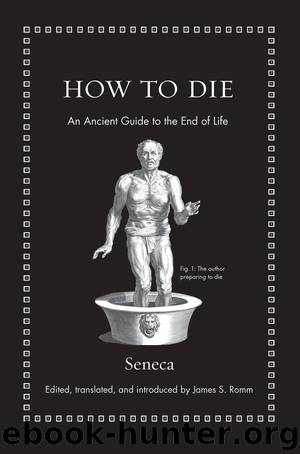How to Die: An Ancient Guide to the End of Life by Seneca

Author:Seneca [Seneca]
Language: eng
Format: epub
ISBN: 9780691175577
Publisher: Princeton University Press
Published: 2017-01-15T07:00:00+00:00
EPILOGUE: PRACTICE WHAT YOU PREACH
Seneca greatly admired Socrates, who met death with equanimity, a scene dramatized by Plato in the dialogue Phaedo. In AD 65, Seneca too got an opportunity to put his philosophic ideas into practice, when Nero, his former student and friend, accused him of complicity in a coup attempt and demanded his death. As in the case of Socrates, followers of Seneca were on hand and later described the sage’s last hour; their accounts have perished but were drawn on by Tacitus in the following passage of the historical chronicle, Annals. Seneca’s suicide turned out to be complicated, and Tacitus’s description of it is not so clearly affirmative as is Plato’s account of the end of Socrates. Readers can judge for themselves whether Seneca achieved the kind of death he had contemplated and prepared for throughout his adult life.
[Nero] dispatched to Seneca a centurion, to announce the final necessity. Seneca, unafraid, asked for his will to be brought in; but the centurion forbade this, so he turned to his friends and said that, since he was barred from leaving them a reward suited to what they deserved, he would leave them a single but most beautiful thing, the template of his life, and that if they bore it in their memory, they would win the reputation of good morals as the reward of their friendship with him…. He embraced his wife, and softened a bit, in contrast to the fortitude he was then displaying; he asked and beseeched that she moderate her grief and not cling to it forever, but soothe her longing for her husband with honorable consolations, by thinking about the virtuous conduct of his life. She, however, insisted that death had been decreed for her as well, and demanded the blow of the executioner’s hand. Seneca, not opposed to her having a share of glory, and also out of love—lest he abandon to injuries a woman who had been so singly devoted to him—said, “I’ve shown to you the delights of life, but you prefer the honor of death; I won’t begrudge you your good example. Let the resolve of this brave exit be equal between us both, though let your death have a greater share of renown.” After he’d said this, they opened their arms with the same stroke of the sword.
Seneca’s body was old and reduced by his meager diet, and allowed his blood only a slow release, so he slashed the veins of his shins also and inside his knees. Exhausted by cruel sufferings, and fearing lest his pain break his wife’s spirit or lest he himself lose his grip and become unable to bear the sight of her torments, he persuaded her to remove herself into a separate room. Then, since his eloquence still held out as each moment passed, he dictated a number of things to the scribes who had been summoned….
As his death was continuing its long, slow course, Seneca asked of Statius Annaeus, a man who had
Download
This site does not store any files on its server. We only index and link to content provided by other sites. Please contact the content providers to delete copyright contents if any and email us, we'll remove relevant links or contents immediately.
The remains of the day by Kazuo Ishiguro(8990)
Tools of Titans by Timothy Ferriss(8379)
Giovanni's Room by James Baldwin(7334)
The Black Swan by Nassim Nicholas Taleb(7118)
Inner Engineering: A Yogi's Guide to Joy by Sadhguru(6788)
The Way of Zen by Alan W. Watts(6611)
The Power of Now: A Guide to Spiritual Enlightenment by Eckhart Tolle(5768)
Asking the Right Questions: A Guide to Critical Thinking by M. Neil Browne & Stuart M. Keeley(5766)
The Six Wives Of Henry VIII (WOMEN IN HISTORY) by Fraser Antonia(5509)
Astrophysics for People in a Hurry by Neil DeGrasse Tyson(5187)
Housekeeping by Marilynne Robinson(4441)
12 Rules for Life by Jordan B. Peterson(4302)
Ikigai by Héctor García & Francesc Miralles(4268)
Double Down (Diary of a Wimpy Kid Book 11) by Jeff Kinney(4266)
The Ethical Slut by Janet W. Hardy(4251)
Skin in the Game by Nassim Nicholas Taleb(4246)
The Art of Happiness by The Dalai Lama(4126)
Skin in the Game: Hidden Asymmetries in Daily Life by Nassim Nicholas Taleb(3999)
Walking by Henry David Thoreau(3956)
